lexander James 'Jimmy' Ridland was a typically hardnosed Southland
forward from the Invercargill Star club, whom he helped to win several Invercargill senior titles. A versatile forward, he could play in most positions though it was as a hooker that he appeared in international rugby. He was a tough-as-teak forward from Southland. Let's back-track a few years first though... In 1876 rugby came to Invercargill, eight years after first established itself in Nelson, NZ. The first division of Otago union took place on 19 February 1887 when, at a meeting held in Invercargill, Southland union, the most southerly in the world, was established. Five clubs supported the proposal to be of independent status including the Invercargill Star club. A traditional shield challenge was started amongst the southerners over 100 years ago, named after former Union Secretary, Robert Galbraith. The Star Rugby Club was the inaugural winner in 1908 but it was the club's deeds from 1919 to 1926 that really became the stuff of history. 'Star' proved unstoppable throughout that period, and was coached by 1905 'Originals' All Black captain (when Gallaher wasn't playing due to injury) Billy Stead. We know very little about Jimmy Ridland's upbringing, schooling or background apart from his listed occupation being 'Blacksmith'. Between 1907 and 1913 Ridland played in 22 matches for Southland. He was also in the South Island side in 1909, 1910 and 1913. Among the major matches in which he appeared for Southland were those against international tourists, the Anglo Welsh in 1908. Playing alongside Ridland was another of the 'First XIII' All Blacks who died in WWI, James McNeece. Ridland also played for Southland against Australia in 1913, and in a Ranfurly Shield challenge against Auckland in 1907. After the 1910 interisland match he was chosen for the All Blacks' tour of Australia. He played in six matches on tour including all three tests. Ridland played six matches for the All Blacks in 1910 along with another of the First XIII All Blacks to die in WWI - Auckland's Frank Wilson. One of these tests was to be Australia's first ever win over New Zealand. Five years later, the world went to war but instead of enlisting straight away, Ridland waited until 1918 to sign-up. The reason why is unknown. England in 1918 was putting pressure on New Zealand to supply more men for the war (1600 per month) and our government provided them. As a result the training was rushed through faster than was necessary resulting in a certain uneasiness amongst the troops. England also had New Zealand provide a Tank Battalion. It was about this time that the U.S were supplying troops for the first time and when they entered the frontlines, our own troops had to literally 'baby-sit' them as they had absolutely no war experience at all. After this 'rushed' training at Trentham, near Wellington in 1918, Ridland made the two month journey to England and would have arrived at 'Sling Camp' in Bulford mid July before heading to Etaples, France, for last minute training. He was then assigned to the highly honoured and respected New Zealand Rifle Brigade who had been through such campaigns as Egypt, Somme, Messines and Passchendaele and was by this stage, heading in a straight line towards Baupaume, France. Pressure on the front lines by the Germans had eased since their last attack at the Somme in April, however the ongoing barrages still claimed an average of 40 New Zealand lives per day. The Brigade had just met and stopped the German army's advance on Paris, effectively turning the tide of the First World War with just the weapons they carried! So, Ridland arrived just after the extremely wet winter of 1918 and would have also just missed witnessing the very first tank battle in history. More battles followed though and he would have experienced what was to be some of the most intense and fierce fighting of war to date; Ancre a la Sambre at Puisieux au Mont, 'Bloody' Bapaume, Crevecoeur and finally Ridland's last battle - Le Quesnoy. Some historians say that our battle-hardened troops were the best amongst their allied fighting neighbours but the truth be known, by this stage in the war we had lost all of our seasoned and experienced leaders either to death, injury or mental and physical breakdown! Coupled with the influx of quickly-trained reinforcements, it wasn't exactly the elite division some say it was. Non-the-less, the New Zealanders still dominated the war arena and stunned the German army with their relentless advances. Just 4 kilometres east of Beaudignies in northern France is Le Quesnoy. This town was in German hands for almost all of the First World War, from August 1914, until the New Zealanders liberated it on 4 November 1918. It was the Division's final action of the First World War and sadly, Jimmy Ridland's last full day alive. Just one week before the Armistice was signed, Ridland, along with the other troops stormed the walled French town. The 90 men killed were among the last of the 12,483 who fell on the Western Front. The capture of the French town by the New Zealand Division has special significance in New Zealand's military history. This is not merely because it was the last major action by the New Zealanders in the Great War but also because it was captured in a particular way. The New Zealanders scaled the 30ft ladders (ex-Paris Fire Brigade) they set against the ancient walls of the town and took the remaining Germans as prisoners with minimal loss of civilian lives. Jimmy Ridland received fatal wounds and died the following day on the 5th November. He is buried in the Caudry British Cemetery just southwest of Le Quesnoy, near Cambrai. To this day, the town of Le Quesnoy continues to mark the important role that New Zealand played in its history. A number of streets are named after New Zealand; Avenue des Neo-Zelandais, Rue de Nouvelle Zelande, Rue de Waikato and Rue de Cambridge... as well as a Square they re-named Place de All Blacks! There is also a New Zealand memorial and a primary school that bears the name of a New Zealand soldier, Lt Leslie Averill, the first officer to go over the 'top' with his Rifle Brigade. These days, visiting New Zealanders are sure to receive a warm welcome from the locals. IF YOU HAVE ANY ADDITIONAL INFORMATION ABOUT JIMMY RIDLAND, PLEASE CONTACT US AT info@nixonpictures.co.nz All Black statistics courtesy of the NZ Rugby Museum: |
Video, Television, Corporate, DVD Production and Filming. Based in Auckland, New
Zealand. From concept planning to filming to final output. Over 10 years experience. |
© 2001 Nixon Pictures. Site built & managed by Nixon Pictures. |
solo worldwide |
format required |
rates |
camera operator |
Find out what we're doing or about to do... |

L.B.I.P.P Qualified |
Award Winning |
Nixon Pictures chooses to use Rocket Rentals. |
View online a selection of video clips. |
NEWS |
We have just returned from Western Australia on a 2-week Gone Fishin' shoot. The
team visited Perth, Exmouth and Broome. |
2001 - Best Documentary 2001 - Best Script 2005 - AVA Silver medal |
Documentary making is our passion. Be it a personal ambition or part of someone
else's desire to tell the world their story - we will listen, shoot and give it
all the attention it deserves. Bruce Nixon |
Click to download a PDF version of our CV. |
Experienced & pleasant |
Competitive & flexible |
Able to provide any |
Can direct & operate |
Based in New Zealand |
'All Blacks At War: The First XIII' |
3rd New Zealand Rifle Brigade Serial Number 72271 Died Tuesday, 5 November 1918, Cambrai, France Age 36 Grave Caudry British Cemetery, France, Ref: BC IV.F.31. |
ALEXANDER JAMES RIDLAND Born 3 March 1883, Invercargill Parents W. Ridland (father), 13 Dublin St, North Invercargill. Education Unknown. Physical Unknown Province Southland Rugby Club First made All Blacks from Invercargill Star. AB# 164 Position Hooker All Black Debut 3 June 1910 v Wellington aged 28 International Debut 25 June 1910 v Australia, Sydney, aged 28 Last Test 2 July 1910 v Australia at Sydney aged 28 Rank Rifleman, 1st Battalion, |
The All Black Games that Ridland played. (+) = substitute; (-) = replaced |
1910 3 Jun vs Wellington at Wellington 26-17 11 Jun vs N.S.W. at Sydney 21-8 22 Jun vs Queensland at Brisbane 21-3 25 Jun vs Australia at Sydney 6-0 27 Jun vs Australia at Sydney 0-11 2 Jul vs Australia at Sydney 28-13 |
Points scored for the All Blacks Ridland did not score any points for the All Blacks. Test Record by Nation Australia Totals |
P W D L t c p dg
pts |
3 2 - 1 - -
- - - 3 2 0 1 1 0 0 0 0 |
A |
'Jimmy' Ridland All Black 1910 |
Caudry Cemetery, France |
Troop Ship SS Maunganui |
Invercargill War Memorial |
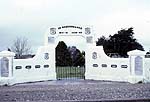

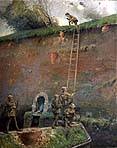

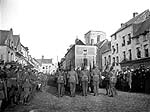
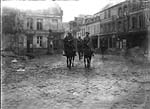
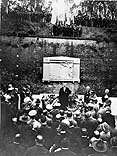

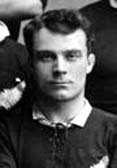
NZ Soldiers entering Les Quesnoy |
Les Quesnoy is liberated - 1918 |
Scaling the walls of Les Quesnoy |
Les Quesnoy NZ Memorial 1921 |
Invercargill Star rugby Club today |
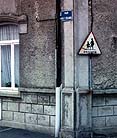
Avenue des Neo-Zelandais |
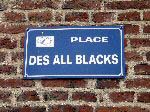
A newly-named square in Les Quesnoy |
Or visit another of the 'First XIII' |
BACK TO MAIN MENU |